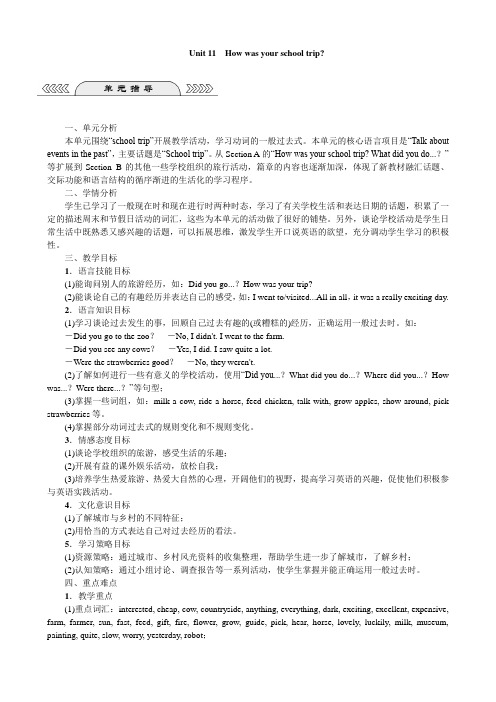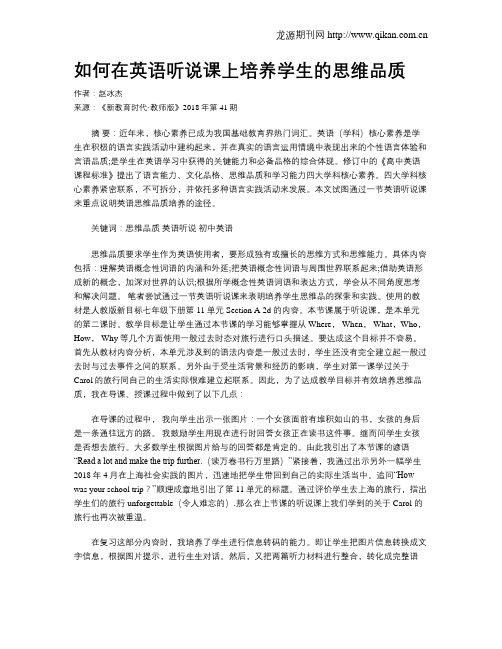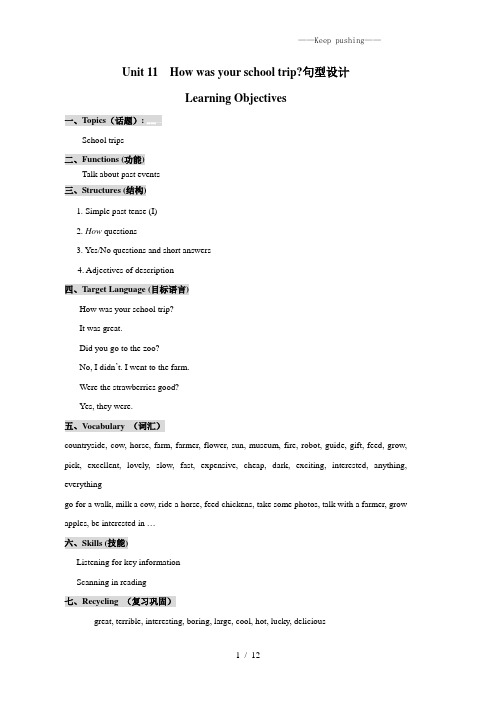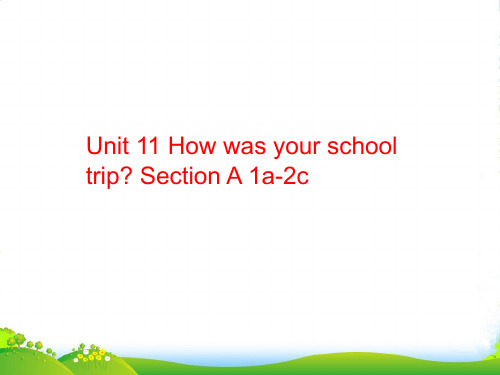七年级下册第11单元SectionA 2
人教版英语七年级下册 Unit 11 Section A (1a-2c)

Unit 11How was your school trip?一、单元分析本单元围绕“school trip”开展教学活动,学习动词的一般过去式。
本单元的核心语言项目是“Talk about events in the past”,主要话题是“School trip”。
从Section A的“How was your school trip? What did you do...?”等扩展到Section B的其他一些学校组织的旅行活动,篇章的内容也逐渐加深,体现了新教材融汇话题、交际功能和语言结构的循序渐进的生活化的学习程序。
二、学情分析学生已学习了一般现在时和现在进行时两种时态,学习了有关学校生活和表达日期的话题,积累了一定的描述周末和节假日活动的词汇,这些为本单元的活动做了很好的铺垫。
另外,谈论学校活动是学生日常生活中既熟悉又感兴趣的话题,可以拓展思维,激发学生开口说英语的欲望,充分调动学生学习的积极性。
三、教学目标1.语言技能目标(1)能询问别人的旅游经历,如:Did you go...?How was your trip?(2)能谈论自己的有趣经历并表达自己的感受,如:I went to/visited...All in all,it was a really exciting day.2.语言知识目标(1)学习谈论过去发生的事,回顾自己过去有趣的(或糟糕的)经历,正确运用一般过去时。
如:-Did you go to the zoo?-No, I didn't. I went to the farm.-Did you see any cows?-Yes, I did. I saw quite a lot.-Were the strawberries good?-No, they weren't.(2)了解如何进行一些有意义的学校活动,使用“Did you...?What did you do...?Where did you...?How was...?Were there...?”等句型;(3)掌握一些词组,如:milk a cow, ride a horse, feed chicken, talk with, grow apples, show around, pick strawberries等。
七下第11单元2b课文原文

七下第11单元2b课文原文Our school life is really wonderful. We have classesin the morning and in the afternoon. After school, we play sports and do some after-school activities. On weekdays, we have many subjects. Maths, Chinese, English, P.E., Musicand Science are our subjects. Sometimes we have art lessons, too. We have science experiments, which are very interesting. We usually play games and sing songs after class. On weekends, we often have more free time. We can watch TV, play computer games or go out to play with our friends. Sometimes we go to the park or the beach. We also have some sports activities, like football or basketball games. We are very happy at school because we have a good time with our friends and teachers. We like our school life very much. 标题:My Favorite Subject 正文:My favorite subject is science because I love science experiments and the teacher is really good. She teaches us to observenature and we get to use some simple scientific equipmentto conduct experiments and study science facts. It's very interesting and exciting for me because it lets me learnnew things every day and explore more about the worldaround me. In addition, the subject also provides opportunities for group work and discussions, which helps me improve my communication skills and team spirit.。
U11 单元知识清单Section A(基础+知识点+语法)-2022-2023学年七年级英语下册

Unit 11单元知识清单Section A一、基础知识清单二、知识点清单知识点①:feed chickens喂鸡【重点注释】feed(feed-feeds-feeding-fed)此处作及物动词,意为“喂养;饲养”,其后常接表示动物名称的词作宾语,feed chickens饲养小鸡。
例如:I feed my dog every day.我每天都喂我的狗。
【拓展记忆】1)feed…to…意为“把……喂给……吃”。
feed后接饲料或食物名词作宾语,to 为介词,其后一般接动物或小孩等名词表示对象。
例如:Please feed some grass to the cow.请给这头奶牛喂些草。
feed可作不及物动词,意为“食,吃”(主要指动物),与介词on连用构成词组,意为“以……为食,靠……为生”。
例如:Sheep feed on grass.绵羊以草为食。
Birds feed on worms and grains.鸟以虫和谷物为食。
知识点②:It was excellent.太好了。
【重点注释】excellent形容词,意为“极好的;优秀的”,相当于very good,含有绝对无疑的意思,通常用于肯定句中,不用于否定句或疑问句中。
例如:The food is excellent here.这里的食品很好。
【拓展】be excellent in表示“在……方面极好”。
例如:He is excellent in maths.他的数学非常好。
知识点③:——Did you see any cows?你看到一些奶牛了吗?——Yes, I did. I saw quite a lot.是的,我看到了。
我看到相当多。
【重点注释】①此问句是一个一般过去时态的一般疑问句,其中did是do的过去式,在此作助动词构成一般疑问句。
本句用于询问过去发生的动作或事情,疑问句中用了助动词did 时,句中的谓语动词应用动词原形,其句型是“Did+主语+动词原形+其他成分?”,其肯定答语是“Yes,主语(代词)+did.”,否定回答是“No,主语(代词)+didn’t.”。
七年级下册unit11单元

soap opera 肥皂剧
肥皂剧最早 是指本世纪30年代美国 无线电广播中播放的一 种长篇广播持续剧。由
A: What do you think of Tom and Jerry?
B: I ___li_k_e___ it. A: Do you ___l_ik_e__ Tom?
B: I ___lo_v_e___ him. How about you? A: I _d_o_n_’_t_l_ik_e__ him. What do you think of Jerry? B: I c_a_n_’_t_s_t_a_n_d_ him. How about you?
句型转 换
1.She likes sitcoms,too.(变成否认句) She doesn’t like sitcoms,either.
2.I think soap opears are boring. (划线提问) What do you think of soap operas?
3.He thinks English is interesting.(划线提问)
What does he /she think of-----He/She loves /likes doesn't mind doesn't like/can't stand ----
(一)Write the sentences in grammar focus and try to remember.
如:Would you mind opening the door?
I can’t stand it! 我不能忍受它/我受不了它! stand 1:站, 站立
e.g. Stand up! 起立 2: 顺利接受;忍耐、忍受(多用于否认句、 疑问句)
七年级下册英语unit 11 Section A第1课时(1a~2d)

第11单元How was your school trip?
【课时建议】 本单元建议5课时
Section A (1a~2d ) (1)
Section A (3a ~3b ) (1)
Section B (1a ~1d ) (1)
Section B (2a~2c ) (1)
Section B (3a ~3c )……………………………………………………………………………………1课时
词汇短语:主要采用图片及多媒体展示助记法。
基本句子:采用多媒体展示及交际法。
语法:般过去时态——采用歌诀助记法。
规则动词的过去式构成方法
过去式构成有规律,一般词尾加-ed 。
词尾有个e ,去e 再加上-ed 。
辅音字母加y,变y 为i 加-ed 。
一辅重闭作尾巴,双写之后加-ed 。
Section A 第1课时(1a~2d
)
布置作业:教师引导学生课后完成本课时对应练习,并预习下一课时内容。
教学说明:
以上周的郊游为话题,引出一般过去时态,简洁明了,直奔主题。
教学说明:
通过听、说、读、写学习训练让学生掌握语言目标——一般过去时态,同时学生的口语表达能力在这一环节得到提升。
如何在英语听说课上培养学生的思维品质

如何在英语听说课上培养学生的思维品质作者:赵冰杰来源:《新教育时代·教师版》2018年第41期摘要:近年来,核心素养已成为我国基础教育界热门词汇。
英语(学科)核心素养是学生在积极的语言实践活动中建构起来,并在真实的语言运用情境中表现出来的个性语言体验和言语品质;是学生在英语学习中获得的关键能力和必备品格的综合体现。
修订中的《高中英语课程标准》提出了语言能力、文化品格、思维品质和学习能力四大学科核心素养。
四大学科核心素养紧密联系,不可拆分,并依托多种语言实践活动来发展。
本文试图通过一节英语听说课来重点说明英语思维品质培养的途径。
关键词:思维品质英语听说初中英语思维品质要求学生作为英语使用者,要形成独有或擅长的思维方式和思维能力。
具体内容包括:理解英语概念性词语的内涵和外延;把英语概念性词语与周围世界联系起来;借助英语形成新的概念,加深对世界的认识;根据所学概念性英语词语和表达方式,学会从不同角度思考和解决问题。
笔者尝试通过一节英语听说课来表明培养学生思维品的探索和实践。
使用的教材是人教版新目标七年级下册第11单元Section A 2d 的内容。
本节课属于听说课,是本单元的第二课时。
教学目标是让学生通过本节课的学习能够掌握从Where, When, What,Who,How, Why 等几个方面使用一般过去时态对旅行进行口头描述。
要达成这个目标并不容易。
首先从教材内容分析,本单元涉及到的语法内容是一般过去时,学生还没有完全建立起一般过去时与过去事件之间的联系。
另外由于受生活背景和经历的影响,学生对第一课学过关于Carol的旅行同自己的生活实际很难建立起联系。
因此,为了达成教学目标并有效培养思维品质,我在导课、授课过程中做到了以下几点:在导课的过程中,我向学生出示一张图片:一个女孩面前有堆积如山的书,女孩的身后是一条通往远方的路。
我鼓励学生用现在进行时回答女孩正在读书这件事。
继而问学生女孩是否想去旅行。
2023年人教版七年级英语下册《Unit 11 How was your school trip》句

Unit 11 How was your school trip?句型设计Learning Objectives一、Topics(话题):School trips二、Functions (功能)Talk about past events三、Structures (结构)1. Simple past tense (I)2. How questions3. Yes/No questions and short answers4. Adjectives of description四、Target Language (目标语言)How was your school trip?It was great.Did you go to the zoo?No, I didn’t. I went to the farm.Were the strawberries good?Yes, they were.五、Vocabulary (词汇)countryside, cow, horse, farm, farmer, flower, sun, museum, fire, robot, guide, gift, feed, grow, pick, excellent, lovely, slow, fast, expensive, cheap, dark, exciting, interested, anything, everythinggo for a walk, milk a cow, ride a horse, feed chickens, take some photos, talk with a farmer, grow apples, be interested in …六、Skills (技能)Listening for key informationScanning in reading七、Recycling (复习巩固)great, terrible, interesting, boring, large, cool, hot, lucky, delicious八、教材分析本单元的话题是谈论学校郊游,要求学生学会使用一般过去式讲述过去发生的事情,学会用一般过去时写日记。
Unit 11 单元整体教学设计英语七年级下册大单元教学(人教版)

学习理解
中的语用功能,随后1d的任务主要为了语言输出,让学 生在与同学进行真实交易的过程当中,能够正确运用所 学的目标语言。
21
统筹课时安排
课时类型
阅读课
教材板块
第四节 SectionB
2a-2c
语篇内容
2a-2c的阅读部分让学生熟悉一些描述性的形容词分辨 他们带有的褒义还是贬义,然后让学生阅读两篇关于学 校旅行的日记,找出这几种描述性形容词,并通过对比 总结两位作者对于同一旅程的不同态度,不仅考查学生 对篇章的理解和培养阅读策略,还训练学生对比分析能 力。
主题 意义
单元 功能
单元主题研读
1 what
本单元以学校浏览为依 托,讲解了不同形式的 游览活动和一般过去时 的用法。
2 why
3 how
帮助学生掌握一般过去时, 可以谈论过去发生的事情。
通过对话、听力、阅读 文段等方式,讲解了一 般过去时,形式多样, 内容丰富。
9
单元目标概览
可以掌握学习出游相关 的词组和句型,掌握一 般过去时的构成和用法。
SA 1a-2c
SA 2d-3b
SB 1a-1d
SB 2a-2c
SB 3a-self check
从周末去农场的活动引入 本单元的动词短语,并呈 现一般过去时的陈述句一
般疑问句和回答。
介绍了国外的学校活动, 开阔了眼界,并加强了语
言输出。
有意识的运用目标语言进 行输出,启发学生模仿阅 读的句型,完成自己的文
SB 1a-1d
本部分新增了更多的学校活动, 去参观博物馆、消防站等,再 次夯实一般过去时的应用。
SA 2a-2c
通过一组问句,确认在农场所 做的事情,用一般过去时进行 提问和回答。
人教版pep英语七年级下册-Unit-11-单元分析

比分析能力。
品店的东西很贵。
分课时教学目标
课时 period 1
period 2
Period 3 Period 4
Period 5
分课时教学目标
学生能够: 1.了解卡罗尔在旅行中做了什么的详细信息,并复述卡罗尔的 旅行经历; 2.正确使用目标语言进行关于旅行的对话。
1.获得埃里克、简和托尼旅行的详细信息; 2.用目标语言复述和谈论这些旅行; 3.从更多方面分享我们自己的旅行,并思考我们可以从旅行中 得到什么。
作业设计 根据农场旅行vlog编写对话(学习理解+应 用实践) 描述自己的一段令人难忘的旅行经历(应 用实践+迁移创新)
利用静态雕像进行故事接龙(应用实践+迁 移创新)
按要求编写和Jim的对话(应用实践+迁移 创新)
写一篇旅行日记(应用实践)
教学内容 语篇类型
Period 4
2b两篇日记 (应用文)
What
Why
How
Helen和Jim的日记,记录了 2b两篇日记是两个人 因为是日记体裁,所以这两
对待同一场学校旅行两人不 对同一场学校旅行截 个语篇均使用第一人称和一
同的感受和评价。
然不同的记录与感受。 般过去时按照旅行发展的顺
Helen认为参观科学博物馆 启发学生对于看待事 序去展开描述,Helen与Jim
行很糟糕,觉得火车很慢车 写作。
lovely, exciting,
厢里面很热,博物馆大且无
terrible, hot, boring等
趣,因为他对机器人不感兴
形成的对比,这不仅考查了
趣。馆内很暗所以他没拍照。
学生对篇章的理解,培养了
而且人很多,他看不清也听
新人教版七年级英语下册unit11全单元分课时课件(共129张ppt)

观察与思考
Bob: Hi, Carol. How was your school trip yesterday? Carol: It was great!
Bob: Did you go to the zoo?
Carol: No, I didn’t. I went to a farm. Look, here are my photos.
What do you do? What do you do? Feed some chickens. Feed some chickens.
Talk with a farmer. Take some photos. Take some photos.
How wasschyouorl stcrhipoo学l t校r旅ip行?
went for a walk
My last trip
milked a cow
My last trip
rode a horse
My last trip
fed chickens
My last trip
talked with a farmer
My last trip
took some photos
___ Did you grow any apples?
√ ___ Do they grow apples?
___ Did you eat them?
___ Were they good?
√
2b Listen again. Circle T for true or F
for false.
1. The farmer showed Carol around the farm.
Bob: Did you ask him any questions?
人教版七年级英语下册Unit11Howwasyourschooltrip教案设计

⼈教版七年级英语下册Unit11Howwasyourschooltrip教案设计UNIT11 How was your school trip?Section A 第1课时(1a?1c)⾃主学习⽅案1.⾃学⽣词,并记住拼读及拼写。
2.预习课本找出重点短语及句⼦。
(见学案⾃学导练内容)3.读记后完成⾃学导练内容。
课堂导学⽅案Step1 情景导⼊Teacher:We had a school trip last week. Did you have a good time? How was your school trip?Students : Not bad/Pretty good/Great/Terrible.Teacher :Did you take any photos?Did you feed chickens?What did you do? Please tell us what you did. Do you want to know what Carol did?环节说明:以上周的校游为话题,引出⼀般过去时态,简洁明了,直奔主题。
Step 2完成教材1a-1c的任务1.认真观察图⽚,将图⽚和la中所给的短语匹配。
集体核对答案,完成la。
(2分钟)2.教师领读la中的词组,学⽣跟读并且识记,然后两⼈⼀组互相提问。
以⼩组为单位总结动词过去式的构成规则,教师补充点拨。
(5分钟)3.⼤声朗读图⽚中的⼩对话,提前感知听⼒内容。
(2分钟)4.认真听录⾳,圈出Carol在校游时所做的事情,集体核对答案,完成lb的听⼒任务。
(3分钟)5.练习lc中的对话,并请学⽣表演。
(2分钟)6.模仿lc中的对话,利⽤la中的图⽚信息,两⼈⼀组来谈论Carol在校游时所做的事情,邀请⼏组学⽣来表演对话。
(4分钟)参考案例:A:Did Carol take any photos?B:Yes,she did. /No,she didn’t.7.⼩结训练。
人教版英语七年级下册Unit11_Section A (1a~2d)教案与反思

第11单元How was your school trip? 原创不容易,为有更多动力,请【关注、关注、关注】,谢谢!落红不是无情物,化作春泥更护花。
出自龚自珍的《己亥杂诗·其五》类别课程标准要求掌握的内容话题School trips 学校旅游Section A 单词milk v.挤奶 cow n.奶牛 horse n.马feed v.喂养;饲养 farmer n.农民;农场主quite adv.相当;完全 anything pron.任何东西;任何事物grow v.种植;生长;发育 farm n.农场v.务农;种田pick v.采;摘 excellent adj.极好的; 优秀的countryside n.乡村;农村 yesterday adv.昨天flower n.花 worry v.& n.担心;担忧luckily adv.幸运地;好运地 sun n.太阳短语milk a cow给奶牛挤奶 ride a horse 骑马feed chickens 喂鸡 quite a lot (of…)许多in the countryside 在乡下;在农村show sb. around…带领某人参观……last week上个星期 go fishing 去钓鱼句型1.—How was your school trip?你的学校郊游怎么样?—It was great! 好极了!2.—Did you go to the zoo?你去动物园了吗?—No, I didn’t. I went to a farm.不,我没有。
我去农场了。
3.Luckily,it didn’t rain, and the sun came out again.幸运的是,没有下雨,太阳又出来了。
Section B单词museum n.博物馆 fire n.火;火灾painting n.油画;绘画 exciting adj.使人兴奋的;令人激动的lovely adj.可爱的 expensive adj.昂贵的cheap adj.廉价的;便宜的 slow adj.缓慢的;迟缓的fast adv.& adj.快地(的) robot n.机器人guide n.导游;向导 gift n.礼物;赠品dark adj.黑暗的;昏暗的 everything pron.所有事物;一切interested aj.感兴趣的 hear 听到;听见短语fire station 消防站 all in all总的说来be interested in 对……感兴趣go on a school trip 举行一次学校旅行along the way 沿途 learn about 了解buy sb. sth. 给某人买某东西 not… at al根本不;完全不句型1. All in all,it was an exciting day. 总的说来,是令人兴奋的一天。
山东省宁阳县第二十五中学七年级英语下册《Unit 11 What do you think of

山东省宁阳县第二十五中学七年级英语下册《Unit 11 What do you think of game showsSection A(1a–2c)》学案(无答案)人教新目标版【学习目标】1.掌握本节课12个新单词及短语。
2.掌握表达看法的句型。
【学习重点】What do you think of……?及其答语。
一. 快乐预习。
1.会读写本单元的单词和短语。
2.自己认读本节课的12个单词及短语并记忆。
3.根据汉语写出下列单词和短语.单词:肥皂_______ 情景喜剧_______ 情景;形势_____没有什么;没有东西______ 哈_____忍受______ 介意______君主;国王______ 事实;实际情况_______短语:肥皂剧;连续剧____________ ……怎么样?__________实际上;其实;确切地说________________ 谈话节目________游戏节目_________体育节目_____________电视节目___________二、合作探究:请翻译并背诵下列句子:1.你认为肥皂剧怎么样?我无法忍受。
_____________________?______________________.2.你认为情景喜剧怎么样?我喜爱_____________________________?____________________.3.Mark认为谈话节目怎么样?他无所谓。
_________________________________?__________________.4.Mary认为饺子王怎么样?她不喜欢。
______________________ _______5.你认为体育节目怎么样?我无所谓。
_____________________________ _______三、拓展提高;根据句意和首字母提示完成单词1.There is n______ in the box , it is empty.(空的)2. He thinks hard ,then he has a good i________.3. I like Chinese Cooking. How a_______ you?4. ---What do you t_______ of Ann? ---I love her .5. Tom doesn’t like exercise ,and he doesn’t like s____ opera.【预习质疑】你在预习过程中有什么问题,请写出。
人教版七年级英语下册教案Unit 11 How was your school trip第一课时

Unit 11How was your school trip?单元目标第一课时Section A (1a-2d) 课时目标show sb. around 带领某人参观learn about 了解,学习grow strawberries 种草莓from...to... 从……到……(时间/地点) pick strawberries 摘草莓in the countryside 在乡下;在农村go fishing 去钓鱼so much fun 非常有趣,很开心at night 在夜里,在晚上重点句子1.—Did you see any cows? 你看见奶牛了吗?—Yes, I did. I saw quite a lot. 是的,我看见了。
我看到了很多头奶牛。
2.—Did you ride a horse? 你骑过马吗?—No, I didn't. But I milked a cow. 不,我没有。
但是我给奶牛挤了奶。
重点句子3.The farmer showed Carol around the farm.这位农场主带着卡罗尔参观了农场。
4.The farmers grow strawberries from December to June. 农民从十二月到六月种植草莓。
5.Carol picked some strawberries and took them home. 卡罗尔采摘了一些草莓并带回了家。
6.—How was your trip? 你的旅行怎么样?—It was excellent. 非常棒。
7.—What did you do? 你做了什么?—I went fishing every day. 我每天都去钓鱼。
8.It was so much fun. 那真是太好玩了。
教学难点让学生初步了解一般过去时的用法,并学会谈论过去的事情;掌握一些关于农场的动词短语自主学习根据句意及音标提示写出单词及其汉语意思。
2013年新人教版七年级英语下册Unit11How-was-your-school-trip全单元课

(1)
(2)
否定句:I didn‘t ride a horse last Sunday.
一般疑问句:
Did you ride a horse last Sunday? 肯定回答:Yes, I did. 否定回答:No, I didn't. 特殊疑问句:
(1)What did you do last Sunday? (2)When did you ride a horse?
What did you do last weekend?
I…… feed chickens fed chickens
milk a cow milked a cow
ride a horse
rode a horse
What do they do What did he/she
every day?
do yesterday?
_D_i_d_ you go to the zoo? No, I didn’t.
Listening
2a Listen and check the questions you hear.
What did the farmer say? Did you grow any apples? √ What did you see? √ Do they grow apples? Did you learn anything? Did you eat them? √ Did you ask him any questions? √ Were they good?
Did you......yesterday? Yes,I did./No,I didn't.
play basketball
watch TV
人教新目标七年级下册Unit11Section AB同步单元测试题附答案

Unit 11 Section A一、单项选择。
( )1.-Did you finish your homework?--。
A. Yes, I didB. Yes, I doC. No, I don'tD. No, I'm not( )2.--How your last summer vacation?--Very .A. did ;funB. was;funC. do;funD. does ; fun( )3. -Did you see in the room?-No,I didn't.A. somethingB. anythingC. nothingD. everything( )4.Han Mei and some beautiful songs last night.A. play ;singB. plays;singsC. played; singD. played; sang( )5.--you at home this morning?--No,I .A. Were; wasn'tB. Were;weren'tC. Was;wasn'tD. Was; weren't二、根据句意和汉语提示写单词。
1. The farmers grow (相当) a lot of orange trees on the farm.2.It is not easy to ride a (马).3. The woman is good at milking a (奶牛).4. My mother (喂) the pet cat 5 minutes ago.5. Look! The girls are (采摘) apples now.6.-What did the teacher (说)?--He (说) he took his son to the zoo last week.三、选词填空并注意形式。
- 1、下载文档前请自行甄别文档内容的完整性,平台不提供额外的编辑、内容补充、找答案等附加服务。
- 2、"仅部分预览"的文档,不可在线预览部分如存在完整性等问题,可反馈申请退款(可完整预览的文档不适用该条件!)。
- 3、如文档侵犯您的权益,请联系客服反馈,我们会尽快为您处理(人工客服工作时间:9:00-18:30)。
1. How was your trip last week? 上周你的郊游怎么样? How was…? 询问某事情况句型 答语: It was great. It was OK. It wasn’t good. All right. (很好) It was not bad. 等 How +be+…? what +be +…+like? How ___her holiday? 她的假期过得怎么样? Eg: _____was
3. It was excellent. 太好了。 excellent adj.极好的,优秀的 very good excellent Eg: The food is__________ here.这里 的食物很好。 excellent She is an __________ doctor.她是 位优秀的医生。
IV. 汉译英
1. 他上周在农场骑马。 Last week he rode a horse on the farm. 2. 他上个月爬山了。 He climbed the mountain last month. 3. 他一小时前喂了小鸡。 He fed chickens an hour ago.
口诀:一加ed,二加d,三要双写, 四注意,y变成ied,特殊形式特殊记。
2.不规则动词的过去式需特殊记忆。 was am(is) are(是) could do/does(做,干) can(能) had have (has)(有) go(走) came feed (喂) come(来) bought eat(吃) buy (买) grow(生长) grew ride (骑) ran run(跑) say (说) saw see (看见) get(变得,到达) taught take(带) teach(教) swim(游泳) swam learn(学习)
quite a lot.
V. 译出下列短语 去散步 去购物 去钓鱼 挤奶牛 骑马 骑自行车 喂小鸡 和某人谈话 拍照
go for a walk go shopping go fishing milk a cow ride a hБайду номын сангаасrse ride a bike feed chickens talk with … take photos
4. I visited my grandparents in the countryside. 我在乡下看望了我的祖父母。 in the countryside 在乡下 in the country country n.国家,农村,乡下 adj. 乡下的
5. It was so much fun. 非常有趣。 fun n(u) 表示“乐趣,开心,有趣的事情”, 1) great/much/a lot of+fun 非常有趣(的事) have fun=have a good time 玩得开心 are _____ _ ____ ____.(正 e.g. The children____having so much fun 玩得很开心) fun Riding a bike is great____.骑自行车是件很 有趣的事。 2) so adv so much 有很多
4. 你昨天去了动物园吗?没有,我去了
农场。 Did you go to the zoo? No, I didn’t. I went to the farm. 5. 你在农场看到一些奶牛吗?看到了, 看到了相当多地奶牛。 Did you see any cows? Yes I did. I saw
were did went fed ate rode said got took learned learnt
I. 写出下列单词的过去式
talk
talked
am /is was go went feed fed did
milk milked are were ride rode
take took see saw
7. Lucky you! 你真幸运! 相当于You’re so lucky. 这是一句非正式口语, Lucky之后的 人称还可以改为me, him。
动词过去式的构成
1. 规则动词的过去式 1) 一般情况下,在动词原形后面加-ed。 2)以不发音e结尾的动词,在词尾直接加-d。 3)以“辅音字母+ y”结尾的动词,先将 y 改为i ,再加 –ed。 4)以重读闭音节(即辅音+元音+辅音)末尾只有一个 辅音字母的动词,要先双写这个辅音字母后,再加 –ed。 look cooked try looked cook tried watch watched live lived play played start used started use stop stopped visit tasted plan visited taste planned pull pulled study studied stop stopped
6. ____ he see any cows on the farm? Did Yes, he did. 7. Did he milk a cow on the farm? No, he ______. didn’t 8. Were the strawberries good? Yes, they _______. were 9. Did you see any cows? Yes, I did. I saw quite a lot. ___ 10. I ___ the chickens last week. fed
It was not bad __ ___ ___ ____.还不错。
2. I went fishing every day. 我每天去钓鱼。 “go+动词-ing 形式”意为“去做某事”。如 go shopping “去购物”,go swimming “去游泳”,go fishing “去钓鱼”, go boating “去划船”,go skating “去滑冰” 等。
III.根据提示完成句子 get 1.I usually ___(get) up at 6:30 in the morning. Today I ______ (get) up at 7:20, I ______ (be) late for class. got was told Mr. Yang ______(tell) me not _______(be) late again. to be Did 2. --______you ______ (have) a good time last Sunday? have --No, I _____ (do not). I went (go) camping with my _____ didn’t rained friends, but it __________(rain). called 3. –Where ______(be) you last night? I ______ (call) you, were but you ________(be) not in. were –Oh, I _________(be) in my uncle’s house. was I ______ (have) supper there. had
Section A 2a-2d
学习目标
1、听力训练,加强对目
标语言的理解。 2、利用所学的目标语言 进行口头交际及分角色 表演对话。 3、学会动词的过去式的 变化规则。
2a Listen and check the questions you hear.
__What did the farmer say? ___Did you grow any apples? √ √ __What did you see? ___Do they grow apples? __Did you learn anything? ___Did you eat them? __Did you ask him any questions? ____Were they good? √ √ 1. anything 不定代词,“某事,某东西”, 主要用于否定句,疑问句中代替something, didn’t see anything He saw something. --否 He__________________.
2c Ask and answer questions about Carol’s visit to the farm. A: What did Carol do? B: She picked some strawberries.
2d Role-play the conversation.
Peter: Hi, Eric. How was your trip last week? Eric: It was excellent. I visited my grandparents in the countryside. Peter: Oh, nice. What did you do? Eric: I went fishing every day. And I fed the chickens with my grandpa. It was so much fun. Peter: Sounds good. How was the weather there? Eric: It was great, and the air was so clean. I watched the stars at night. They were so beautiful. Peter: Lucky you.
do
II. 用适当的词填空
1. How was your school trip? It was great. ___ 2. How _____ you yesterday? were 3. Today is Monday. Yesterday ___ was Sunday. 4. What did you do the day before ___ yesterday? 5. ____ you ride a horse last week? Did
